Property Workshop is proudly reader-supported. When you buy through links on our site, we may earn a small Amazon affiliate commission but this does not affect the price you pay. Learn more here.
As I discovered while writing my recent hole-cutting guide, accurately cutting along a curved line repetitively and consistently requires a high-quality jigsaw.
To help you pick the best jigsaw for your DIY needs, we’ve spent hours separating the good from the bad to arrive at the best jigsaw in the UK.
Jigsaw Reviews — The UK’s Top 5 in 2024
In the shortlist below, we’ve included a variety of corded and cordless models across various price points, but all five products are suitable for sculpting, trimming, and shaping various materials.
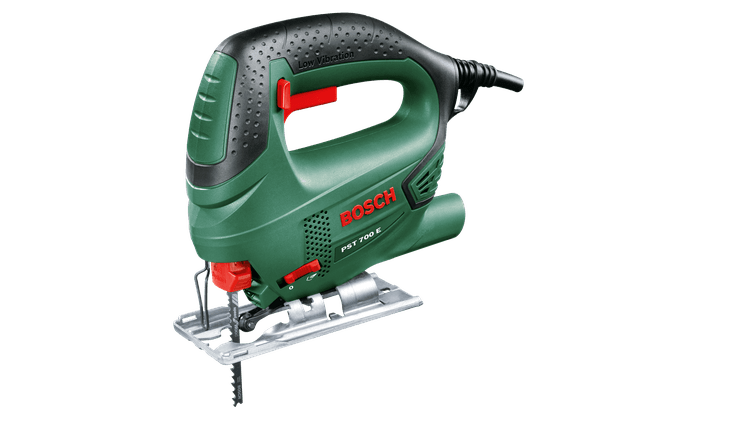
1. Bosch PST 700 E
- Minimal vibration
- Lightweight and compact design
- Cuts up to 70mm from 45° to 90° angles
- SDS provides quick keyless blade changes
Tipping the scales at 1.7 kg, Bosch’s PST 700 E is a relatively lightweight product. However, that doesn’t detract from its power, with stroke rates varying between 500 and 3,100 SPM — the second-fastest we tested. Furthermore, it slices through 70mm of wood and 10mm of aluminium, though its steel cutting depth is limited to 4mm.
A double-sided lock switch makes this model easy to use regardless of your dominant hand. Another nice touch is the cutting line blower, which you can deactivate when it’s unnecessary. However, our favourite feature is the throttle sensitivity — adjust the pressure on the trigger, and the machine instantly responds.
While some buyers may prefer a cordless device, this is an excellent product if you require the always-available reassurance of a plug. It even has a hanging hook for storing the power cable.
The fact that it costs half as much as its cordless sibling elevates it straight to the top of our list.
| Pros | Cons |
|---|---|
| Outstanding value | Limited cutting depths |
| Lightweight chassis | Not the most comfortable jigsaw to hold for long periods |
| Can reach 3,100 SPM |

2. Dewalt DCS334N-XJ
- Intelligent variable speed trigger and lock-off switch
- 4-position pendulum action
- The toolless adjustable shoe with anti-scratch cover bevels to 45 degrees in both directions
- Quick keyless blade change system that accepts T-shank blades
- Overmolded soft grip handle
- LED work light
- Includes dust blower
This DeWalt jigsaw is an imposing-looking tool, with chunky levers and canary yellow plastic cladding hiding a brushless motor. Considering the size of this model, it’s a surprise that it weighs only 2.1kg.
The requirement for a clip-on battery might deter some purchasers, though this device’s 18V motor produces a beefy 3,200 SPM to (narrowly) put it on top of the power board.
Its 135mm timber cutting capacity and 25mm metal cutting depth dwarf some of our other shortlisted products, making it a strong contender for serious DIYers and professionals. It’s also an orbital jigsaw, so it cuts forwards and up & down.
Practicality is handled with a tool-free adjustable shoe that bevels beyond 45 degrees in both directions. Twin LEDs illuminate the cutting line, and a dust blower keeps any markings visible.
DeWalt’s entry might have won this test if not for an extremely high purchase price and the need to budget for an additional battery.
| Pros | Cons |
|---|---|
| The highest SPM rate | Extremely expensive |
| Superb cutting depth | Requires a separate battery |
| Orbital cutting functionality |
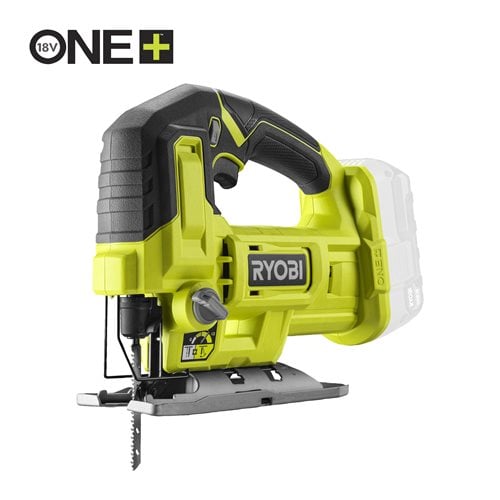
3. Ryobi R18JS-0 ONE+
- Variable speed trigger
- 4-stage pendulum cutting action
- LED work light and blower improve cut line visibility
- Toolless blade clamp for quick blade changes
Ryobi is another manufacturer marketing a range of cordless products with interchangeable batteries, with this model sold as a body-only jigsaw.
Key features include a max cutting capacity of 101mm in wood and 6mm in steel and cutting speeds between 1,100 and 3,000 SPM. Adjusting the base to +/- 45 degrees is also possible.
The R18JS-O ONE+ is our only shortlisted product supplied with a circular saw blade which measures 150mm in diameter. However, this is the only blade provided, so you must purchase separate jigsaw blades.
Following a line is easy thanks to a built-in LED work light, and the keyless blade clamp saves scrabbling around for accessories. However, its garish body colour and pale grey buttons/levers mean it’s not always immediately obvious how and where to make certain adjustments.
| Pros | Cons |
|---|---|
| Cordless | No vacuum attachment |
| It comes with a circular saw blade | No standard blades provided |
| Capable of cutting over 10cm of timber | Garish colour scheme |
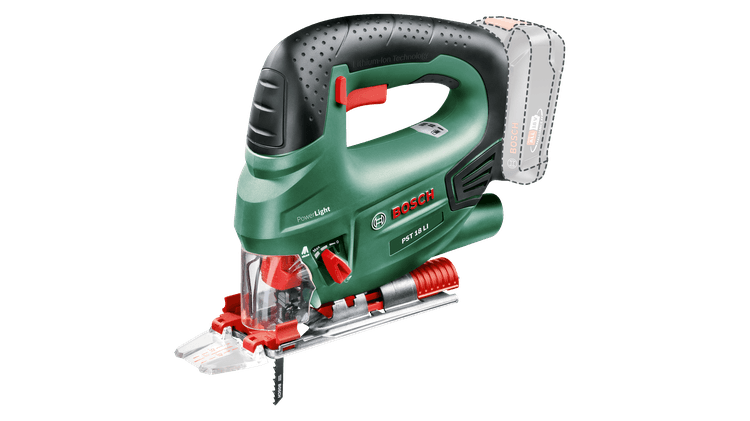
4. Bosch PST 18 LI
- Vibration-reduced cutting
- Includes Bosch CutControl for straight cuts
- Pendulum action produces faster sawing
- Up to 80mm cutting depth
- Syneon Technology regulates energy use
Sold without a battery or charger, Bosch’s cordless PST 18 LI shares these accessories with other products in the company’s Power4All range.
A sensitive trigger offers variable speeds for cutting different materials, making mincemeat of quick cuts while offering precision for more intricate shaping. However, with a stroke rate of only 2,400 SPM, the PST 18 LI is the slowest on our list.
Weighing only 1.6kg, the PST 18 LI has a textured handle designed to make ongoing use more comfortable, though left-handed users might find the position of the lock-off switch inconvenient.
This model includes a light and dust-blowing function to keep the cutting line clear, while Bosch’s proprietary Slotted Drive Shaft (SDS) technology makes swapping blades relatively easy.
The PST 18 LI also offers dust extraction via a vacuum cleaner connection, and the chassis can hold six saw blades, even though Bosch only supplies one. The major drawback of this jigsaw is its price, costing twice as much as its cordless sibling.
| Pros | Cons |
|---|---|
| Compatible with other Bosch 18V products | Expensive |
| Variable speeds | Not great for left-handed users |
| Lightweight | Only 2,400 SPM |
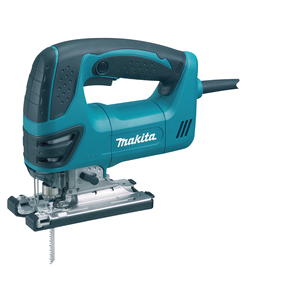
5. Makita 4350FCT
- Quick release toolless blade change
- Sturdy adjustable base
- Variable speed control
- Built-in work light
Weighing nearly 4kg, Makita’s British-made 4350FCT is undoubtedly the heavyweight contender in our quest to find the best jigsaw in the UK.
The 4350FCT’s adjustable speed ranges from a maximum of 2,800 SPM to a minimum of 800 SPM. This extra power allows it to cut through 135mm of timber and 10mm of steel, which none of the other products in this review can match. Then again, it has a price none of the others come close to, and it’s not even cordless.
Makita supplies several accessories with the 4350FCT, including a dust nozzle, carry case, anti-splintering device and a set of assorted blades. These blades can be changed without chucks or Allen wrenches, while the aluminium die-cast base is reassuringly solid.
There’s a light for tracking lines, and Makita has done its best to cut down on vibration and noise with double insulation.
| Pros | Cons |
|---|---|
| Peerless cutting depth | Expensive |
| Solid construction | Too heavy for some |
| Includes lots of accessories | No vacuum system |
Best Jigsaw — 2024 Comparison Table
| Model | Rating | Price | Cordless | Light | Vacuum | Orbital? | Weight | Max Cutting Depth | Max SPM |
|---|---|---|---|---|---|---|---|---|---|
| Bosch PST 700 E | 9 | £ | No | Yes | Yes | No | 1.7kg | 70mm | 3,100 |
| Dewalt DCS334N-XJ | 9 | £££ | Yes | Yes | Yes | Yes | 2.1kg | 135mm | 3,200 |
| Ryobi R18JS-0 ONE+ | 8 | £ | Yes | Yes | No | No | 2.1kg | 101mm | 3,000 |
| Bosch PST 18 LI | 8 | £££ | Yes | Yes | Yes | No | 1.6kg | 80mm | 2,400 |
| Makita 4350FCT | 7 | ££ | No | Yes | No | Yes | 3.84kg | 135mm | 2,800 |
Jigsaw Buying Guide
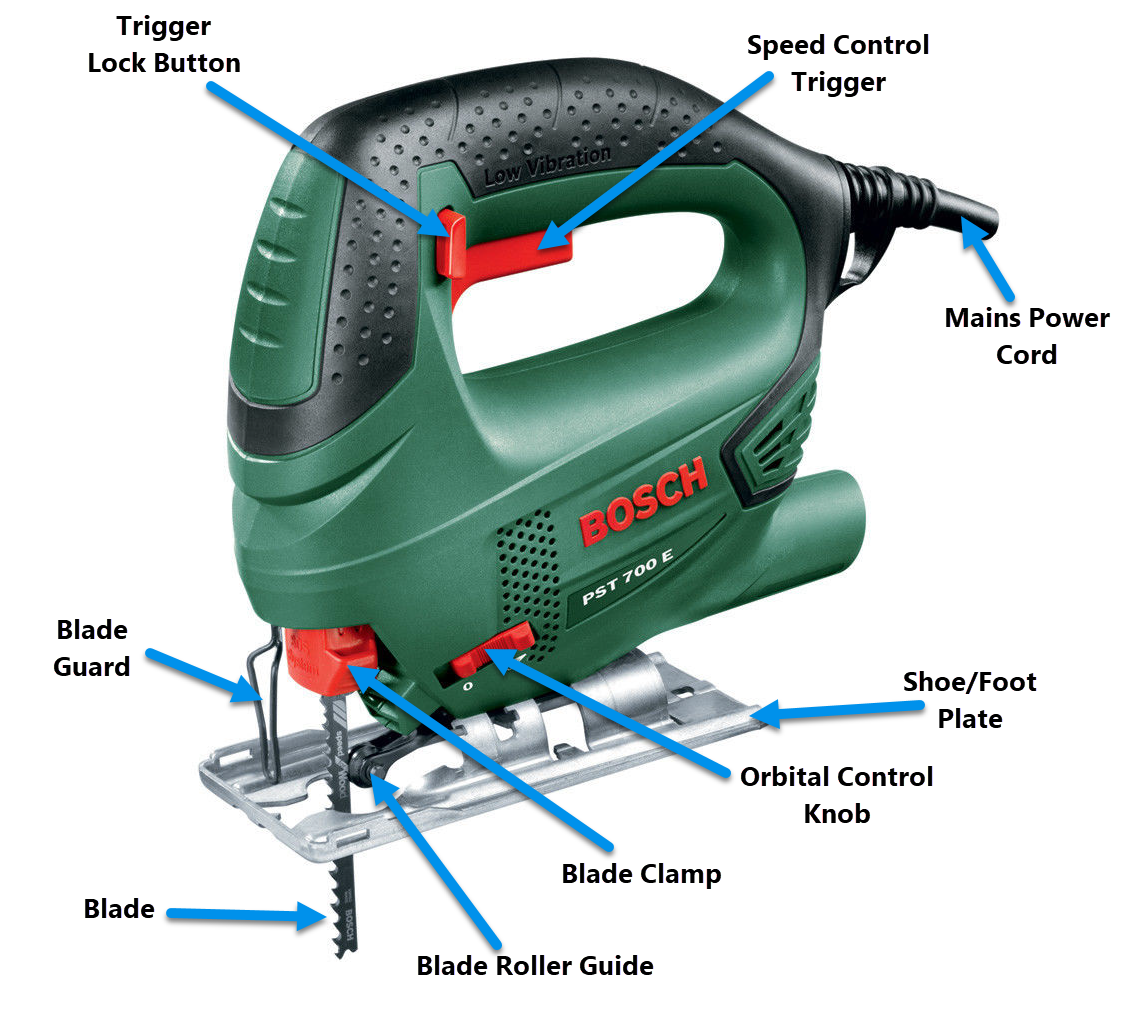
As we’ve seen from the above product reviews, there’s a wide disparity in the design and functionality of different jigsaws. Even two products from the same manufacturer can take different approaches to slice through wood or metal.
Below are the critical characteristics to look for, starting with an obvious distinction — power.
Motor Power
You might see different figures describing motor power depending on whether the jigsaw is corded or cordless. Corded jigsaws run between 400 and 900 Watts, whereas cordless devices focus on the number of strokes per minute (SPM) the motor can generate.
Since SPM is a measurement shared by corded and cordless devices, it’s the metric we’ve focused on in our reviews. In general, we recommend jigsaws that generate around 3,000 SPM. During our testing, only the cordless Bosch fell significantly below this figure.
Orbital Cutting Action
All jigsaw blades move up and down, but some incorporate an orbital cutting action where the blade simultaneously moves forward.
Jigsaws with an orbital action require far less pressure from the user to slice through materials, but they’re also considerably more expensive because of this superior cutting power. Whether or not they justify this premium depends on the frequency of usage and the density of materials you’re cutting.
Of our five shortlisted products, only the DeWalt and Makita are orbital.
Variable Speed Control
Unlike orbital cutting, every product on our list offers a variety of speed settings. Speed is managed through pressure applied via the trigger or a dedicated switch.
Makita offers intuitive speed settings from 1 to 5, while the Bosch jigsaws employ variable-speed triggers to increase or decrease performance.
Maximum Cutting Depth
Cutting depth is one area where results vary considerably, depending on various factors from the power source to blade length.
The heavyweight Makita and high-performance DeWalt offer timber-cutting depths of 135mm, whereas the cordless Bosch only cuts metal up to 5mm in depth.
Generally, wood cutting depths are much greater than metal, and high-end models almost double the timber cutting depth of more affordable jigsaws. For example, the Bosch PST 700 E has a cutting depth of 70mm, whereas the Dewalt DCS334N-XJ offers 135mm!
Curving Cuts
Jigsaws are great for cutting shapes and curves in wood, especially for those with a steady hand and an eye for detail.
Angled cuts can be achieved with adjustable bases, typically supporting 45-degree incisions, though the DeWalt DCS334N-XJ goes up to 47 degrees.
Furthermore, the Bosch PST 18 LI allows users to move the saw plates to the device’s rear for added flexibility and precision.
Jigsaw Blades
Different types of jigsaw blades with varying cutting depths are required for cutting through wood and metal.
The Bosch PST 18 LI has an integrated storage compartment capable of housing up to six blades. Bosch also has a proprietary blade-changing mechanism, while DeWalt, Makita and Ryobi offer tool-free switching.
T-shank blades are the industry default, replacing the older U-shank blades. You can identify T-shank blades by their twin protrusions at the far end of the cutting edge.
Corded vs Cordless Jigsaws
One of the most significant decisions you must make when buying a jigsaw is whether or not to go cordless. There are advantages to each option:
| Corded Advantages | Cordless Advantages |
|---|---|
| Won’t run out of power during a project. | No risk of becoming entwined in the cable when cutting around large objects. |
| Generally less expensive. | Never have to restart precision cutting because the cable won’t stretch far enough. |
| Fewer parts to carry around — no detachable batteries or separate charging leads. | Works in the garden since there’s no need for a plug socket, reducing dust exposure. |
| Lighter due to lack of batteries. | Operates in buildings without power, providing the batteries are fully charged in advance. |
Corded jigsaws are generally cheaper since they don’t use expensive batteries or chargers. You can pay as little as £40 for a decent corded jigsaw, with cordless models roughly twice the price. However, a corded jigsaw with high-end specifications can cost over £100.
Check whether your cordless jigsaw includes a battery — these are often sold separately, increasing the overall cost*.
*Pro Tip: You may already have compatible batteries if you own other power tools from the same manufacturer and product range.
Other Jigsaw Features to Consider
These may not be essential jigsaw features, but they help simplify common DIY tasks.
LED Light and Laser Guide
An LED light (or two, as found on the DeWalt) helps illuminate what can otherwise be a gloomy cutting area, with the jigsaw’s body often blocking surrounding light.
A laser guide helps follow straight lines but is useless when making angled or curved cuts.
Dust Blower
Jigsaws create considerable dust that often accumulates immediately ahead of the blade, obscuring pencil lines and wood grain. Blowers displace the dust, making it easier to follow cut lines.
Note: Jigsaws often lack dust collection facilities like vacuum attachments and dust boxes commonly found on power sanders.
Blade Guard
Some surfaces are prone to splintering, particularly if they have a coating like melamine or veneer.
A blade guard sits on either side of the blade as it moves around, pinning down surrounding material to prevent it from ripping or fragmenting.
Typically made of clear plastic or steel, the blade guard is rarely referred to in marketing materials. Still, you can see whether the blade is surrounded by a guard in product photos.
Rubber Coated Grip
Like many power tools, jigsaws create a lot of friction and heat, making them hard to hold, especially as your hands become sweaty.
A rubberised handgrip counteracts the slipperiness often associated with plastic, while any form of tread or ribbing also improves its practicality.
Final Thoughts
Based on our analysis above, you should be well-placed to choose the best jigsaw for your specific requirements.
Every product has advantages — the Bosch units have variable power triggers, the Ryobi doubles as a circular saw, and the Makita has the greatest cutting depth.
DeWalt might have won this test if not for its purchase price. Ultimately, it was beaten by the cordless Bosch PST 700 E jigsaw that represents incredible value. Providing you’re not planning on slicing through oak beams, it’s a worthy winner.

